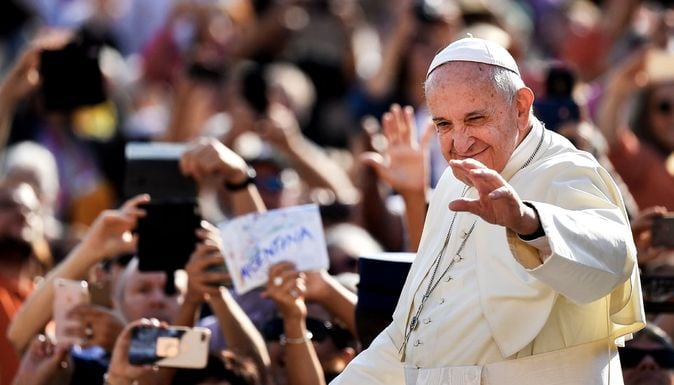Who Was Pope Francis? His Global Impact Explained.
Who was Pope Francis, and why did his passing impact the world? This blog examines his life, legacy, and the global response to his passing.


Alright, let's talk about Pope Francis. You know, it's funny, even if you're not Catholic, you probably know his name. He just had that kind of presence, right? And now that he's gone, it's like the whole world is taking a moment to reflect. So, who was he, really, and why does his passing feel like such a big deal?
A Humble Beginning: From Buenos Aires to the Vatican
Pope Francis wasn't born into royalty or anything. He was Jorge Mario Bergoglio, a regular guy from Buenos Aires, Argentina. He worked as a bouncer, a lab technician, taught literature – you know, lived a real life before becoming a priest. And I think that's part of what made him so relatable. He wasn't some distant figure in an ivory tower. He understood the struggles of everyday people. And then, bam, he's elected Pope in 2013. Can you imagine?
A Pope of the People: Breaking Down Barriers
He did things differently, you know? He chose to live in a simple apartment instead of the papal palace. He talked about climate change, poverty, refugees – things that mattered to people outside the Church. He wasn't afraid to challenge the status quo. He'd say things like, "The poor are the treasure of the Church," and "Build bridges, not walls." It was like he was reminding us that we're all connected, that we're all in this together. In fact, his powerful words often cut through the noise, reminding us of our shared humanity.
Think about his simple yet profound statement, “A little bit of mercy makes the world less cold and more just.” Or his plea to “Safeguard creation, because if we destroy creation, creation will destroy us!” These weren’t just words; they were calls to action, resonating far beyond the Catholic community. His ability to connect with people through simple, direct language was a hallmark of his papacy.
A Voice for the Marginalized: Showing Compassion
He had a real heart for the people on the fringes. The ones society often forgets about. He visited prisons, refugee camps, hospitals. He'd wash the feet of inmates on Holy Thursday. It was like he was showing us what Jesus meant when he said, "Whatever you did for one of the least of these brothers and sisters of mine, you did for me" (Matthew 25:40). He wasn't just talking about compassion; he was living it.
A Legacy of Dialogue: Building Bridges Across Faiths
He wasn't just about talking to Catholics. He reached out to leaders of other religions – Muslims, Jews, Buddhists. He believed in dialogue, in finding common ground. He understood that we're all part of one human family. And that's a powerful message in a world that can feel so divided.
The Global Reaction: Why the World Cares
The widespread reaction to Pope Francis’s passing underscores his unique position in the world. He wasn't just a religious leader; he was a moral compass for many, regardless of their faith. His consistent calls for social justice, environmental responsibility, and interfaith dialogue resonated globally. In a world often polarized, he offered a message of unity and compassion. His voice carried weight in international forums, and his opinions were sought on issues ranging from poverty to climate change. His passing leaves a void, not just within the Catholic Church, but in the global conversation about humanity's shared challenges.
What Happens Now? A Question of Continuity
The big question now is, what happens next? Will the new pope continue his legacy? Will they have the same kind of impact? It's hard to say. But one thing's for sure: Francis set a high bar. He showed us that the Church can be a force for good in the world. And that's something the world will be watching closely.
A Call to Action: Living His Message
Ultimately, I think his passing is a call to action for all of us. Not just Catholics, but everyone. To live with more compassion, to build bridges instead of walls, to care for the marginalized, and to remember that we're all connected. That's the kind of world he wanted to see. And it's up to us to make it happen.
Frequently asked questions
Where did Pope Francis come from before becoming Pope?
He was from Buenos Aires, Argentina, and had a variety of jobs before entering the priesthood.
What were some of the key characteristics of Pope Francis's papacy?
He was known for his humility, compassion, and focus on social justice, interfaith dialogue, and environmental issues.
Why did Pope Francis's passing have such a global impact?
Because he was seen as a moral voice and a symbol of hope, whose messages of compassion and unity resonated beyond the Catholic Church.
What was Pope Francis's attitude towards interfaith relations?
He strongly promoted dialogue and understanding between different religions, believing in finding common ground.
What are some of the questions being asked now that Pope Francis has passed?
People are wondering if the next Pope will continue his legacy and if the Catholic Church will maintain its global influence on social issues.
How did Pope Francis approach people who were marginalized?
He showed a deep compassion and actively reached out to them, visiting prisons, refugee camps, and hospitals.
